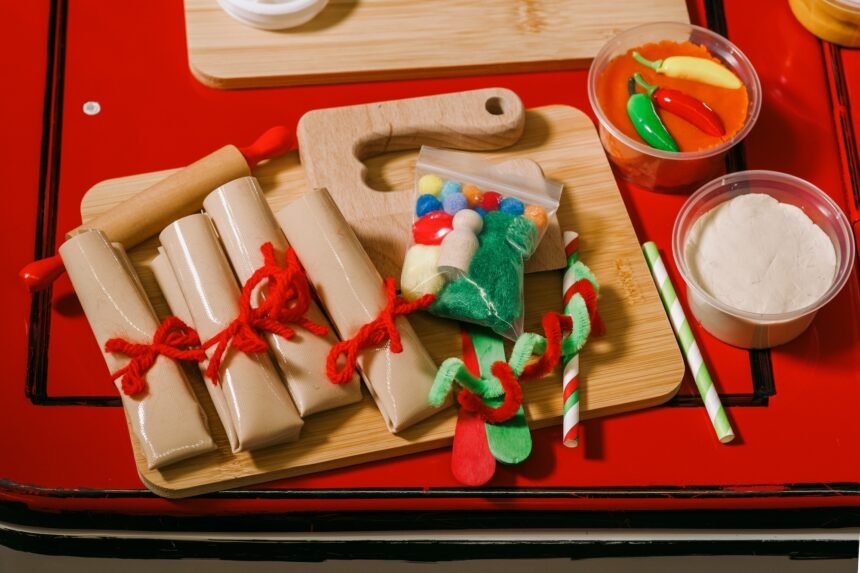For Catherine Contreras, some of her fondest childhood memories involve food — specifically, making tamales with her family.
Wanting to capture this memory for her children, and sure that others felt the same about the holiday tradition of tamaladas, Contreras pursued an idea born out of the early days of the pandemic four years ago.
“When we were in lockdown, we were having virtual tamaladas with my family. My kids were very little, and they really wanted to do it,” said Contreras, the mother of five. “I thought we could take some playdough and get a husk and let them play that way.”
Seeing how much her kids enjoyed the activity, Contreras knew this was something she had to pursue. Along with her retired schoolteacher mother, Marie Bauml, Contreras founded Fresh Masa, a business that produces sensory-friendly toy kits that can be used to educate and entertain.
Each kit contains Play-Doh and small tools to create a themed activity — including the Latino-themed Tiny Tamalada, Teeny Taco and My Favorite Panadería — that allow users to pretend to spread and shape “masa” to make tamales, tortillas and pan dulce.
“As an autism mom, we do so much that involves sensory things, like Play-Doh. I thought ‘let’s bring this to everybody,’” she said, while showing some of the items sold at Fresh Masa’s spot inside Painted Tree Boutiques marketplace on the city’s North Side.
Contreras, who was one of the founders of the San Antonio-centric T-shirt company BarbacoApparel, again looked to her heritage and family history to craft a way to support her family while also keeping traditions alive.
She isn’t alone.
Restauranteur Drew Glick pays homage to his Jewish heritage and New York roots through food.

Open since 2016, Max & Louie’s New York Diner serves several traditional Jewish dishes, including matzo ball soup, potato latkes and cheese blintzes, as part of its regular menu offerings.
Glick said serving such foods at his North Side eatery is a way to share the traditions he grew up with, not only with those familiar with the dishes but also with diners who’ve never tried them.
“Most of the items on the menu are there for specific reasons,” the Queens native said, adding that many of the dishes “have a very specific history in the Jewish heritage but they’re also Eastern European.”
Glick talked of customers who recalled family gatherings of their childhood while eating the diner’s Hungarian stuffed cabbage or cheese blintzes. Others, he said, have recalled their time living in New York and eating at diners like Max & Louie’s.

“History is history. Some things move away from our memories, and you forget. But you try not to forget,” Glick said, adding how much food can trigger our recollections.
“I have very fond memories of my grandmother’s split pea soup,” he said. “I think it’s the first thing I’ve ever eaten.”
The soup, prepared the way his grandmother made, is part of the diner’s soup-of-the-day lineup. It’s also included in meal packages and special menus designed for Jewish celebrations, including Hanukkah and the High Holidays.

The menu isn’t the only way Glick honors his family history. The diner’s name is a nod to his ancestors — paternal grandfather, Louie Glick, and great uncle, Max Braverman. Both immigrants and both butchers, the men’s likenesses adorn the diner’s logo.
For some San Antonio business owners, preserving tradition and honoring heritage extends bloodlines.
At Chas Market & Kitchen, owner J.T. Kim and his family honor the history of the East Side business that originated in the 1930s as Charles Supermarket. The Kim family bought the market in the 1980s and decided to honor its original owner, Charles De Leon, by keeping the name Chas.
The establishment is part neighborhood convenience store, where customers can find mainstream groceries alongside Korean specialty items, including jars of homemade kimchi. And it has continued to serve the breakfast tacos made with fresh homemade tortillas that have been neighborhood favorites for decades.

For lunch and dinner, customers can order from a Korean menu of bibimbap, bulgogi, banchan and all-you-can-eat Korean barbecue. All dishes are served fresh and in the same manner as Koreans eat during mealtime, the Kim family said.
“Many customers are surprised that we have Mexican breakfast tacos in the morning and authentic Korean food from lunchtime,” said Brian Kim, J.T. Kim’s son. “We are simultaneously preserving the heritage of Mexican immigrants as well as our own immigration story from South Korea to San Antonio.”
Hwa Y. Kim, J.T. Kim’s wife, started sharing her homemade Korean recipes with patrons about 10 years ago through the dishes served at Chas, Brian Kim said.
“We are so proud of our heritage and food, but at the same time so thankful that many in our community love Korean food,” he said.
For one San Antonio organization dedicated to preserving history and customs, part of its mission is to support black-owned businesses through weekly markets and special events, including the upcoming Kwanzaa Market Festival on Dec. 7.

The Pan African Cultural Community, based on the East Side, is a nonprofit that strives to be a “cultural resource for the community,” its website states.
Aundar Maat, founder and director of the organization, said the Kwanzaa Market Festival isn’t just for those who commemorate the holiday. It’s also a chance for the community to learn about the annual celebration of African heritage and culture that originated in the 1960s.
The market festival provides an opportunity to purchase items from local vendors that can be used in Kwanzaa celebrations, including candles, clothing and art, Maat said. Kwanzaa begins Dec. 26 and concludes Jan. 1, highlighting one of the celebration’s seven principles each day.
The Pan African Cultural Community holds many of its events at the building that once housed Our Place Adult Day Care Center, which closed in 2020. Weekly cultural events, including a drum circle and poetry open mic, take place on Saturdays, when a market promoting Black-owned and small businesses also is held.
For those who strive to preserve customs and honor history, they say the effort is worth it, especially when seeing younger generations show interest.
Contreras, who has memories of making tamales and spending time in the kitchen with her grandmothers, said for some families like hers there is a gap in generations passing on traditions.

“My mom is of the generation that headed to the workforce, so she didn’t spend as much time in the kitchen as my grandmothers,” Contreras said. “There’s a gap in that aspect of the culture.”
That’s where Contreras hopes her Fresh Masa kits can help families reignite customs, or at least promote families spending time together.
Though the kits are toys designed for young kids, older children and adults with dexterity problems can benefit from handling the items, she said. And some older adults with cognitive issues can be helped by the memories that playing with the pretend masa brings.
One of the reasons Contreras and her mother said they created Fresh Masa products was so families could spend time together and share stories of ancestors and traditions.
“This is one way to connect and have those experiences while teaching them about the culture and family history,” she said.











